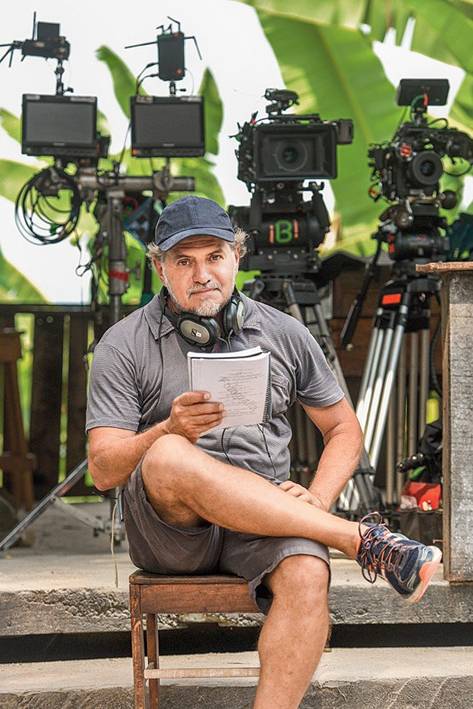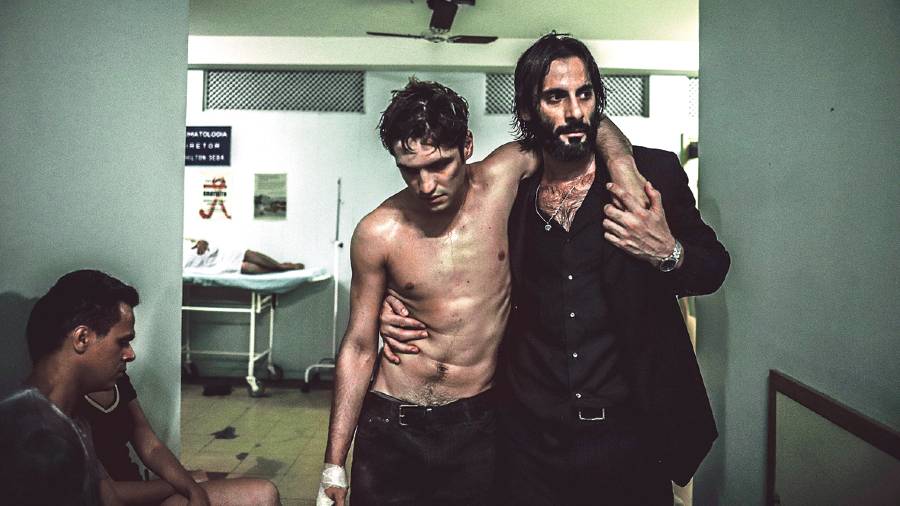Dom, Amazon Prime Video’s first Brazilian original series, is inspired by a real-life story and follows the journey of a father (Victor Dantas, played by Flavio Tolezani), a cop who dedicates his life to fighting narcotics traffickers, and his son (Pedro Dom, played by Gabriel Leone), a drug addict who becomes one of the most wanted criminals in Brazil.
With the eight-episode series now showing on the streaming platform in over 200 countries, The Telegraph caught up on a video chat (through a translator) with Flavio Tolezani and Gabriel Leone to know more about their show and their father-son dynamic on screen.
This is a show inspired by real events. Was there a specific reason that made you want to be a part of Dom?
Flavio Tolezani: The story, in itself, is already an amazing story. The way the script is written is just impeccable. The director, Breno (Silveira) narrated it to me, and he was very passionate about it. Breno and his story completely overwhelmed and embraced me, and I was on.
Gabriel Leone: In the early 2000s, this was a well-known story in Rio de Janeiro. I was very young, but my parents had heard of it. The records about this story are very shallow and superficial, and even sensational. It actually all started with the real Victor... he wanted to tell his story, his son’s story and the story of their relationship in a more human way, and also so that it could be a reflection for different families who are going through a similar problem.
The characters are very compelling. Breno is a director I already admire and to just hear from him how this story was going to be told got my attention. One of the main issues when it comes to our characters — the father and the son — is that they spend a great deal of time in conflict, they are constantly clashing with each other. Sometimes, they even come to physical blows. When we were rehearsing, Flavio and I realised that even during those scenes, one of the main tenets of this series is the love between the father and the son. We had to make sure that love could always be seen between the two of them.
When it comes to a human story like this, do you look for relatable threads in your characters in order to humanise them better?
Flavio: I think there is no rule. It’s more about how that character, with all its complexities, reaches me. I look for what hits me when I hear a story, whether it seems familiar to me or not is secondary. Every actor likes a challenge, and that comes in various forms. Sometimes, a character may look like me, but the way he behaves and reacts could be completely different. Sometimes, they don’t look like us at all. For example, Gabriel looks completely different in this series. I go by whether a story touches me, whether it motivates me to talk about it and the relationships that are part of that story. That’s what does it for me. It’s almost instinctive, you know.
Gabriel: For me, there’s no prerequisite to picking a part, other than the fact that it’s a story and a character that moves me. They have to have something to say that I want to say through my work. Some characters have traits that are closer to me, both physically and internally, but others don’t. And that’s what being an actor is all about... it’s about opening our bodies to all kinds of possibilities.
The world is now a global entertainment scape. Sitting in India, we can now watch a Brazilian-original series at the same time as the rest of the world. What do you make of these changing times?
Flavio: Oh, it’s really opened up possibilities, for us as actors and for the Brazilian content space, in terms of reach. You are talking to us from India, our work will be shown around the world.... Added to the fact that it’s Amazon Prime Video who have invested a lot of effort and are interested in having good artistic work. We feel very supported.
Gabriel: Dom is a very specific story to the Brazilian context, to the Rio de Janeiro space, but then it’s also universal because the story is about a father and a son, and how drugs and addiction can interfere in a family’s relationship. I am sure every country, in a way, has that reality. Lots of families can relate to it even if they haven’t gone through it themselves.
Director Breno Silveira speaks to The Telegraph about the world of Dom

Breno Silveira
The genesis
This story has been with me for 12 years. Victor (Dantas) called me and told me about it. What I love about this story is the surreal journey of both these characters. This is a story which encapsulates what happened to Rio de Janeiro... why there is so much violence here. There are many movies and TV shows that talk about drug trafficking, but this one talks about it from the inside... what Victor went through, what Pedro went through. Victor realised that violence only made the fight against drugs worse, and his own son turns out to be a drug addict. They were similar and very interesting people.
I like telling father-and-son stories set in Brazil. What I liked about this story is that despite the circumstances, the love between the two of them never stopped existing... it was always there. There was no way I couldn’t like this story.
Making a specific story universal
I always look for stories that the whole world can relate to. My dream is to communicate the stories of Brazil to as many people globally as possible. I am happy to know that this specific story is now travelling to so many countries. Essentially, we are all similar, and the feelings and emotions that guide my work is the main aspect... I love to get people emotional. Not something melodramatic but real, genuine emotion.











